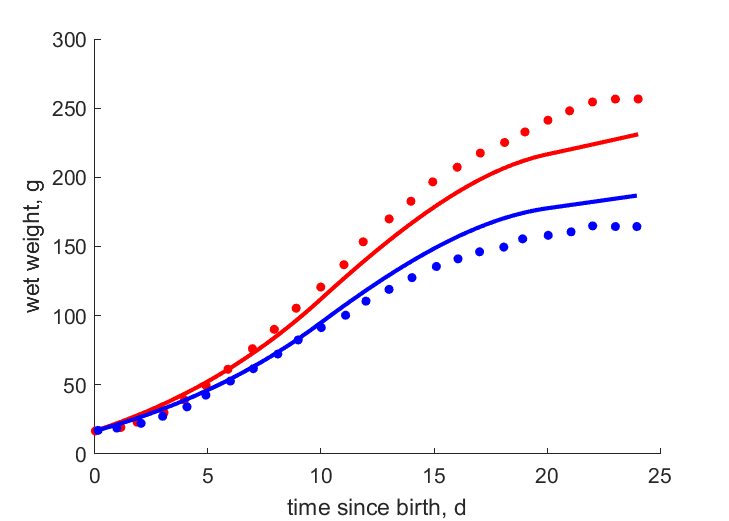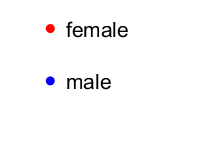Predictions & Data for this entry
| Model: std | climate: B, C, D | migrate: Ml | phylum: |
| COMPLETE = 2.5 | ecozone: THp | food: biCvb, biCvm, biCva, biCii | class: |
| MRE = 0.038 | habitat: 0iFm, 0iTh | gender: Dg | order: |
| SMSE = 0.005 | embryo: Tnpf | reprod: O | family: |
Zero-variate data
| Data | Observed | Predicted | (RE) | Unit | Description | Reference |
|---|---|---|---|---|---|---|
| ab | 33 | 32.88 | (0.003509) | d | age at birth | Wiki |
| tx | 24 | 23.99 | (0.0004635) | d | time since birth at fledging | Moss1979 |
| tp | 72 | 72.09 | (0.001302) | d | time since birth at puberty | guess |
| tR | 365 | 365 | ( 0) | d | time since birth at 1st brood | AnAge |
| am | 7373 | 7374 | (0.0001247) | d | life span | AnAge |
| Wwb | 16.5 | 16.54 | (0.002689) | g | wet weight at birth | Moss1979 |
| Wwi | 310 | 313.9 | (0.01265) | g | ultimate wet weight for female | Moss1979 |
| Wwim | 180 | 166.2 | (0.07689) | g | ultimate wet weight for male | Moss1979 |
| Ri | 0.01233 | 0.01235 | (0.001457) | #/d | maximum reprod rate | Wiki |
Uni- and bivariate data
| Data | Figure | Independent variable | Dependent variable | (RE) | Reference |
|---|---|---|---|---|---|
| tW_f |   | time since birth | wet weight | (0.09386) | Moss1979 |
| tW_m |   | time since birth | wet weight | (0.1008) | Moss1979 |
Pseudo-data at Tref = 20°C
| Data | Generalised animal | Accipiter nisus | Unit | Description |
|---|---|---|---|---|
| v | 0.02 | 0.01907 | cm/d | energy conductance |
| p_M | 18 | 913.7 | J/d.cm^3 | vol-spec som maint |
| k_J | 0.002 | 0.03751 | 1/d | maturity maint rate coefficient |
| k | 0.3 | 0.3005 | - | maintenance ratio |
| kap | 0.8 | 0.9621 | - | allocation fraction to soma |
| kap_G | 0.8 | 0.8002 | - | growth efficiency |
| kap_R | 0.95 | 0.95 | - | reproduction efficiency |
Discussion
- body temperature is guessed and only on target after a few days, as discussed in Kooy2010
- Males are assumed to differ from females by {p_Am} only
- mod_1: v is reduced
- mod_2: males have equal state variables at b, compared to females
- mod_3: Pseudo-data point k is used, rather than k_J; Data set tp and parameter t_R are added, the latter replacing clutch interval t_N. Postnatal T is based on PrinPres1991, see get_T_Aves. See further the revision page, theme puberty
Bibliography